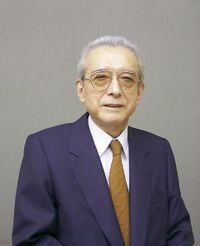Hiroshi Yamauchi: Difference between revisions
SethAllen623 (talk | contribs) No edit summary |
SethAllen623 (talk | contribs) (Actually, Doshin the Giant was released when Yamauchi was still Nintendo's president, but that was a Japan-only game. And as an addendum to this, some Nintendo games released in the early days after he left office would credit Yamauchi as EP instead of Iwata due to being produced under his tenure.) |
||
| (32 intermediate revisions by 19 users not shown) | |||
| Line 1: | Line 1: | ||
{{ | {{person infobox | ||
|image=[[File:Hiroshi-yamauchi.jpg|200px]] | |||
|image=[[ | |||
|born=November 7, 1927 | |born=November 7, 1927 | ||
|died=September 19, 2013 (aged 85) | |died=September 19, 2013 (aged 85) | ||
| Line 7: | Line 6: | ||
}} | }} | ||
'''Hiroshi Yamauchi''' (山内 | '''Hiroshi Yamauchi''' (山内 溥, * November 7, 1927 — † September 19, 2013) was the third president of [[Nintendo]] Co, Ltd.; he held the position for 53 years, from 1949 until 2002, when he declared [[Satoru Iwata]] his successor. He was Chairman of Nintendo's Board of Directors and was the third-richest man in Japan. As president, Yamauchi expanded Nintendo's scope from playing card manufacturing to wider toymaking for the international market, later transitioning into large-scale video game manufacturing in the late 1970s. Just as how Nintendo previously became Japan's biggest playing card company under his predecessors, so too did it become the world's biggest entertainment software company under Yamauchi. | ||
Yamauchi assisted in the production of ''[[Donkey Kong (game)|Donkey Kong]]'', and was the executive producer of all subsequent games published by Nintendo, up until his retirement. Five consoles were created by Nintendo during his tenure; the last was the [[Nintendo | Yamauchi assisted in the production of ''[[Donkey Kong (game)|Donkey Kong]]'', and was the executive producer of all subsequent games published by Nintendo, up until his retirement. Five home consoles were created by Nintendo during his tenure; the last was the [[Nintendo GameCube]], which was released in 2001. ''[[Super Mario World: Super Mario Advance 2]]'' was the last video game in the ''Super Mario'' franchise (and overall) to be released in international markets under Yamauchi's administration. | ||
His persistence in marketing the [[R.O.B.|Robotic Operating Buddy]] (R.O.B.) with the [[Nintendo Entertainment System]] allowed Nintendo to revitalize the | His persistence in marketing the [[R.O.B.|Robotic Operating Buddy]] (R.O.B.) with the [[Nintendo Entertainment System]] allowed Nintendo to revitalize the video game market in North America, which had been in a severe decline following the {{wp|video game crash of 1983}}. He died of pneumonia in 2013. | ||
{{Wikipedia}} | |||
{{ | |||
{{People}} | {{People}} | ||
[[Category:People]] | [[Category:People]] | ||
[[Category:Deceased]] | [[Category:Nintendo]] | ||
[[Category:Deceased people]] | |||
[[de:Hiroshi Yamauchi]] | |||
[[it:Hiroshi Yamauchi]] | |||
Latest revision as of 05:20, January 13, 2024
| Hiroshi Yamauchi | |
|---|---|

| |
| Born | November 7, 1927 |
| Died | September 19, 2013 (aged 85) |
| Super Mario–related role(s) | Third President of Nintendo |
Hiroshi Yamauchi (山内 溥, * November 7, 1927 — † September 19, 2013) was the third president of Nintendo Co, Ltd.; he held the position for 53 years, from 1949 until 2002, when he declared Satoru Iwata his successor. He was Chairman of Nintendo's Board of Directors and was the third-richest man in Japan. As president, Yamauchi expanded Nintendo's scope from playing card manufacturing to wider toymaking for the international market, later transitioning into large-scale video game manufacturing in the late 1970s. Just as how Nintendo previously became Japan's biggest playing card company under his predecessors, so too did it become the world's biggest entertainment software company under Yamauchi.
Yamauchi assisted in the production of Donkey Kong, and was the executive producer of all subsequent games published by Nintendo, up until his retirement. Five home consoles were created by Nintendo during his tenure; the last was the Nintendo GameCube, which was released in 2001. Super Mario World: Super Mario Advance 2 was the last video game in the Super Mario franchise (and overall) to be released in international markets under Yamauchi's administration.
His persistence in marketing the Robotic Operating Buddy (R.O.B.) with the Nintendo Entertainment System allowed Nintendo to revitalize the video game market in North America, which had been in a severe decline following the video game crash of 1983. He died of pneumonia in 2013.